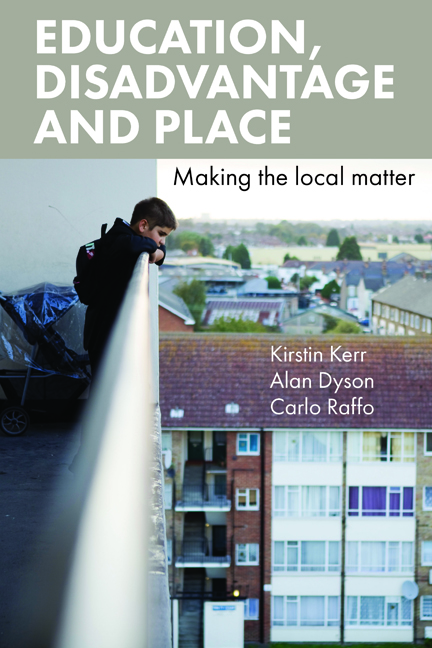Book contents
- Frontmatter
- Contents
- List of tables and figures
- Notes on authors
- Acknowledgements
- one Introduction
- two Why place matters in education
- three Local education systems as products of place: a case study
- four Learning from the past
- five Learning from the present
- six A rationale for a new generation of area-based initiatives
- seven Developing understandings of place as a basis for intervention
- eight Evaluation and monitoring
- nine Governance and accountability
- ten Children and places in hard times: some concluding thoughts
- References
- Index
five - Learning from the present
Published online by Cambridge University Press: 25 February 2022
- Frontmatter
- Contents
- List of tables and figures
- Notes on authors
- Acknowledgements
- one Introduction
- two Why place matters in education
- three Local education systems as products of place: a case study
- four Learning from the past
- five Learning from the present
- six A rationale for a new generation of area-based initiatives
- seven Developing understandings of place as a basis for intervention
- eight Evaluation and monitoring
- nine Governance and accountability
- ten Children and places in hard times: some concluding thoughts
- References
- Index
Summary
As we saw in Chapter Four, England has a rich history of area-based initiatives (ABIs), not least in the proliferation of education-focused and other initiatives between 1997 and 2010. Whether of the traditional stand-alone design or embedded within wider universally progressive policies to tackle disadvantage, these were initiated by central government. Their purposes – and, to greater and lesser extents, their actions and target areas – were state-determined. It is, therefore, perhaps not surprising that they more often treated target areas as containers for poor outcomes into which additional resources could be dropped, rather than as dynamic and distinctive places. In response, we have suggested that the next evolutionary step for ABIs lies in their engaging more closely with an ecological understanding of how poor outcomes come to be concentrated and perpetuated in particular places. This, in turn, would require greater power and leadership to be located at a local level.
Such arguments immediately invite challenges about where local leadership would come from, and whether – without the impetus of a nationally mandated initiative to provide resources, impose structures, require action and demand accountability – ABIs could actually be developed locally in future. These questions appear particularly pertinent to education-focused ABIs, not least because of the steady increase in school autonomy and growth in academies, and, correspondingly, the increasing emasculation of local authorities (LAs) vis-à-vis local educational arrangements. This means that in many places – as in Stockborough in Chapter Three – there may be no obvious mechanisms in place that can effectively bring schools together to address local concerns, or enable them to embed their actions in wider local strategies in any meaningful way.
However, on the basis of our extensive engagement with disadvantaged places across England over the last 10 years, we would suggest that, in many places, the situation is perhaps not as bleak as it might appear. In no small part, this is because whatever the limitations of earlier ABIs, they have created important legacies in many places. For example, our research on extended services (Cummings et al, 2011a) found that the local coordination of more-or-less autonomous schools was beginning to emerge with respect to their extended service role.
- Type
- Chapter
- Information
- Education, Disadvantage and PlaceMaking the Local Matter, pp. 89 - 108Publisher: Bristol University PressPrint publication year: 2014



